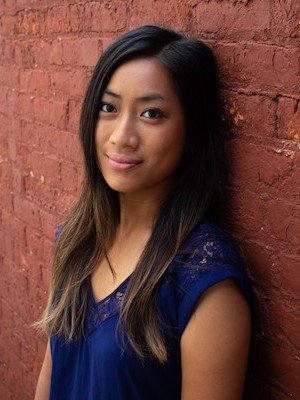Alumna Daphne Palasi Andreades '19 Signs Two-Book Deal with Random House

Alumna Daphne Palasi Andreades '19 recently signed a two-book deal with Random House for her debut novel, Brown Girls, and a forthcoming novel.
Brown Girls explores the lives of young women of color in Queens, NY. A novel in vignettes, the book traverses great deals of time and space, tracing the women's lives from childhood to adulthood, from their upbringing in Queens to new lives in other cities—all the while exploring the forces that bind them to each other, to their neighborhood, and to their families.
Brown Girls first received praise when an excerpt of the novel—five vignettes—won the 2019 Kenyon Review Short Fiction Contest. The contest's judge, Mia Alvar, said of the winning submission: "Brown Girls is a vibrant, pitch-perfect tale of growing up and making good, leaving home and looking back. The lives of young women of color from Queens, New York leap off these pages through a collective voice that feels at once frank and poetic, unexpected yet warmly familiar...the author explores nuances of race and class, sex and marriage, family and community with great sensitivity and heart. And like the best short fiction, Brown Girls harnesses space and time masterfully, moving us through neighborhoods and cities, from first loves to future selves, all within 1185 well-chosen words. With every stirring image and tight, musical turn of phrase, this story charmed, often surprised, and deeply moved me."
An excerpt of Brown Girls was also featured in VQR Online's The Best 200 Words I Read All Week, selected by Assistant Editor Heidi Seigrist; and Kenyon Review Fiction Editor Kirsten Reach nominated the work for This This This Podcast, which spotlights new fiction (episode forthcoming).
In an interview with Kenyon Review, Andreades shares: "I was drawn to structuring Brown Girls using vignettes because I loved that it was a form that allowed me to leap through time and space...I also studied poetry before pursuing fiction, and felt the compressed nature of vignettes allowed me to incorporate some of the qualities I admire in poetry: a close attention to imagery, a musicality in the language, and an experimentation with white space. Additionally, I felt that this fragmented form mirrored the fragmented experience that people of color and immigrants, from my observation, sometimes feel."
Andreades shared the following statement about the birth of Brown Girls and its development from a short story to a novel: "I started writing Brown Girls in my second year at Columbia. I was in Elissa Schappell’s fiction workshop, which ended up being a class that completely changed the way I approached my writing. Elissa is the kind of teacher who encourages her students to be bold, to take risks, whether formally, thematically, or both, in one’s work—All things I needed to hear at the time. One day, if I remember correctly, Elissa wrote a quote by Toni Morrison on the board: ‘Write the book you want to read but doesn’t exist yet.’ All of these words were swirling around in my brain when I began writing about working and middle-class girls living in Queens, NY—all characters and a setting I wished to read about but hadn’t seen represented in literature before.
In workshop, I was also introduced to the work of Jayne Anne Philipps, who blew me away for how she wove poetic techniques into her fiction. Reading her work flipped a switch in my mind and helped expand my understanding of what fiction “can” or “should” do. I’ve come to believe that it’s important for artists to innovate, to challenge and push beyond preconceived boundaries in their work. I think innovation happens by artists being voracious and incorporating not just what they read or see in an art gallery, for instance, but incorporating ALL aspects of life—what they experience, imagine, what they question, lines from an ad on the side of a bus, a funny IKEA drawing, anything and everything—and bringing them all to bear in their work.
Originally, Brown Girls started out as a short story for Elissa's workshop. Up until then, I’d only written short stories—I love the short story form; it’s a form that helped me believe I could pursue fiction in the first place—and I didn’t view Brown Girls as different. However, for the rest of Elissa’s class, and for my workshop with the equally fantastic and life-altering Paul Beatty after, I kept writing pages, and the piece grew longer, so I shifted into calling it a “novella.” I envisioned including it in the story collection I was working on. But, for the year after I graduated the MFA, I kept working on “the novella,” until, startlingly, it dawned on me that, Oh, I might have a novel. I don’t remember who said this, but it holds true: 'A story is as long as it needs to be.'"
Daphne Palasi Andreades was awarded the 2018 Henfield Prize and a Creative Writing Teaching Fellowship while at Columbia University. Her work has received support from institutions such as the Bread Loaf Writers' Conference, the Sewanee Writers' Conference, Martha's Vineyard Institute for Creative Writing, where she won the 2018 Voice of Color Prize, and other honors. Her fiction explores diaspora, immigration, and the far-reaching effects of colonialism and imperialism. She currently lives in Brooklyn.